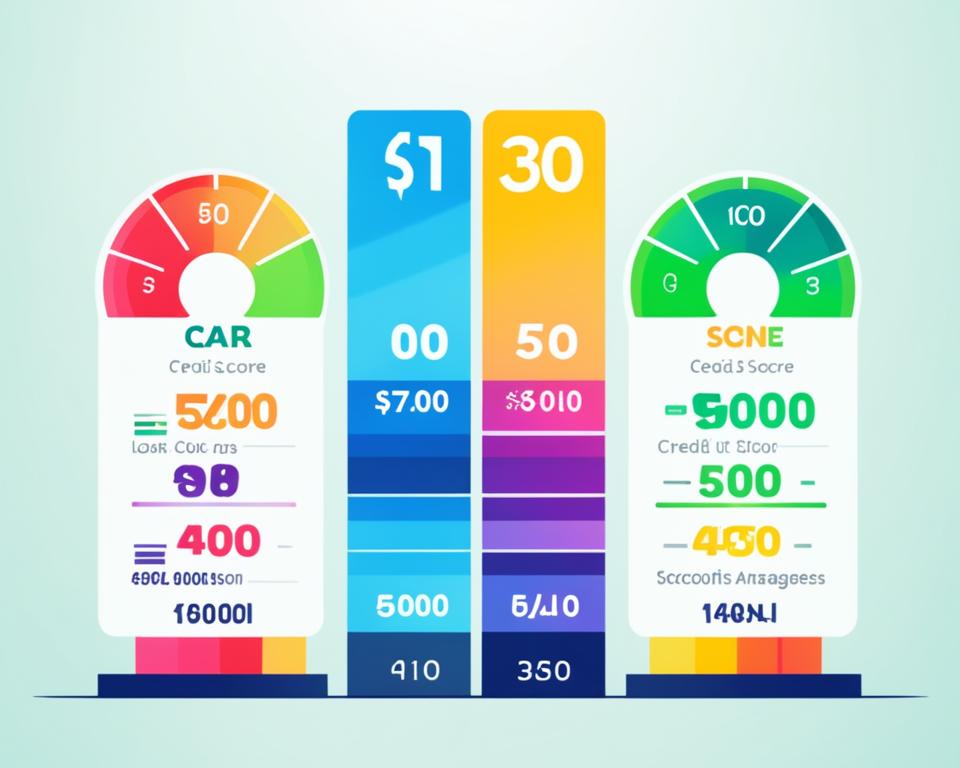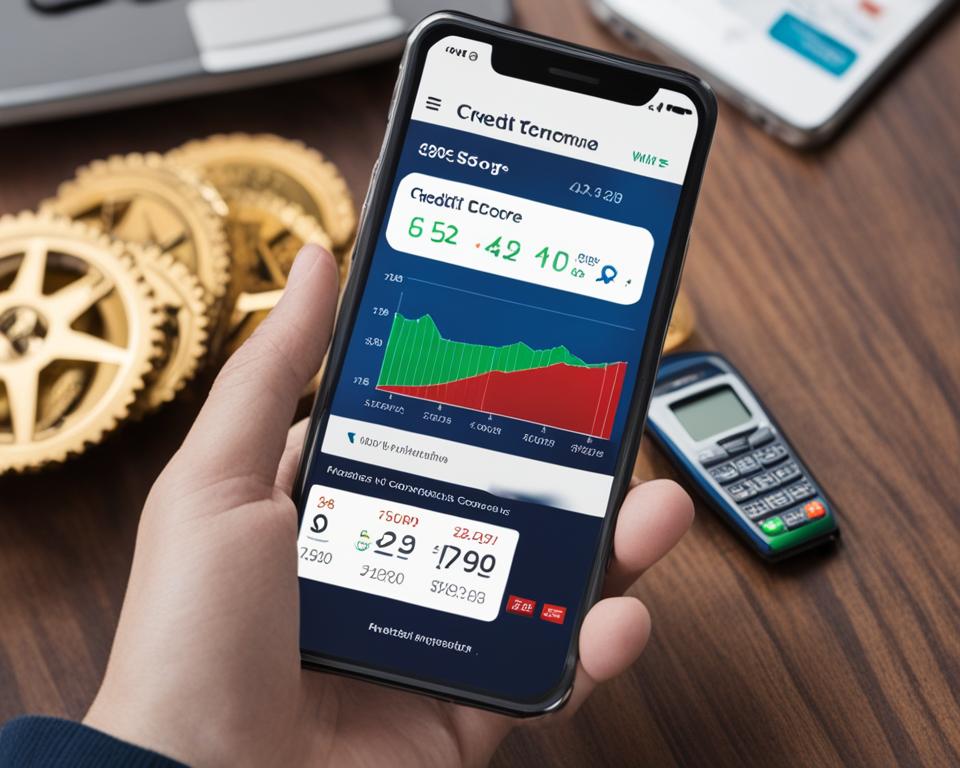When it comes to buying a car, understanding your credit score is essential. Your credit score plays a crucial role in determining your eligibility for an auto loan and the terms you’ll receive. But what credit score is needed to buy a car? Let’s explore the ideal credit score for car buying success.
Key Takeaways:
- A FICO credit score of at least 600 is typically needed to qualify for a traditional auto loan.
- Subprime borrowers may need to consider bad credit car loans with higher interest costs.
- Lenders use credit scores to assess your loan repayment likelihood.
- Higher credit scores can lead to more favorable interest rates and loan terms.
- Checking and monitoring your credit score is important before purchasing a car.
Understanding the Importance of Credit Scores for Car Loans
Lenders use your credit score as an indication of your likelihood to repay a loan. A higher credit score can lead to more favorable interest rates and terms for your auto loan. The minimum credit score required and other eligibility factors vary among lenders, so it’s important to consider your credit score before heading to the dealership.
When it comes to car financing credit score requirements, each lender has its own set of criteria. While some lenders may have a minimum credit score requirement of 600, others may require a higher score for loan approval. It’s crucial to understand the qualifying credit score for a car loan to ensure you meet the necessary requirements.
Having a good credit score is essential when it comes to purchasing a vehicle. A qualifying credit score for a car loan not only increases your chances of loan approval but also plays a significant role in determining the interest rates you’ll be offered. A higher credit score can mean lower interest rates, resulting in more affordable monthly payments.
“Your credit score is like a financial report card. It provides lenders with an insight into your creditworthiness and helps determine the level of risk they are willing to take.”
Different Credit Score Models Used in Auto Lending
When it comes to determining creditworthiness for auto loans, lenders rely on various credit score models. The two most commonly used models are the FICO score and VantageScore.
FICO scores, which range from 300 to 850, are widely accepted and trusted in the lending industry. They provide lenders with a comprehensive evaluation of an individual’s credit history and ability to manage debt. On the other hand, VantageScore, also on a 300 to 850 scale, utilizes a slightly different methodology but still offers valuable insights into an applicant’s creditworthiness.
Additionally, some auto lenders may utilize a specific variant of the FICO score known as FICO Auto Score. This version focuses specifically on an individual’s ability to repay debts, offering lenders an even more refined assessment of the applicant’s creditworthiness in the context of auto lending.
Understanding which credit score model a lender utilizes is important, as different models may result in varying credit score ranges. By familiarizing yourself with the credit score ranges used by lenders, you can better gauge your chances of car loan approval and negotiate more favorable terms.
| Credit Score Range | Credit Rating |
|---|---|
| 300-579 | Poor |
| 580-669 | Fair |
| 670-739 | Good |
| 740-799 | Very Good |
| 800-850 | Excellent |
Above is a table illustrating the general credit score ranges and their corresponding credit ratings. Keep in mind that each lender may have their own specific credit score criteria and rating systems, so it’s important to research and consult with lenders directly to understand their requirements.
Having a clear understanding of the credit score models used in auto lending and the corresponding credit rating ranges can empower you to take the necessary steps to improve your credit, ultimately increasing your chances of car loan approval and securing more favorable interest rates.

How Credit Scores Affect Auto Loan Terms
Your credit score plays a crucial role in determining the interest rates and terms you’re offered for your auto loan. A higher credit score indicates a lower risk for lenders, resulting in more favorable rates. On the other hand, a lower credit score may lead to higher interest rates and less favorable loan terms.
When lenders evaluate your credit score, they use it as a measure of your creditworthiness and financial responsibility. A high credit score suggests that you have a history of consistently making payments on time and managing your credit effectively. As a result, lenders are more confident in your ability to repay the auto loan.
With a higher credit score, you are likely to qualify for loans with lower interest rates and better loan terms. This means that you may pay less in interest over the life of the loan and potentially have lower monthly payments. Additionally, you may have access to a wider range of loan options and financing offers.
On the other hand, if your credit score is lower, lenders may consider you to be a higher risk borrower. As a result, they may offer you loans with higher interest rates and less favorable terms. This could mean higher monthly payments and potentially paying more in interest over the life of the loan.
To illustrate the impact of credit scores on auto loan terms, consider the following table:
| Credit Score Range | Interest Rate | Loan Term | Monthly Payment |
|---|---|---|---|
| Excellent (780-850) | 2.5% | 60 months | $350 |
| Good (700-779) | 4.0% | 60 months | $400 |
| Fair (620-699) | 6.5% | 60 months | $450 |
| Poor (500-619) | 10.0% | 60 months | $500 |
This table demonstrates the varying interest rates, loan terms, and monthly payments based on different credit score ranges. As you can see, a higher credit score in the excellent range leads to significantly lower interest rates and monthly payments compared to a lower credit score in the poor range.
It’s important to note that while credit scores are crucial in determining auto loan terms, they are not the only factor lenders consider. Other factors such as your income, employment history, and debt-to-income ratio may also play a role in the loan approval process and terms you’re offered.
Understanding the impact of credit scores on auto loan terms can help you make informed decisions when it comes to financing your car purchase. Taking steps to improve your credit score before applying for an auto loan can potentially save you money in interest and open up more favorable loan options.
Checking Your Credit Score for Car Buying
One of the important steps in the car buying process is checking your credit score. Your credit score plays a crucial role in determining the interest rates and loan terms you’re offered. By checking your credit score, you can understand where you stand and take necessary measures to improve it. Here’s how you can check your credit score and monitor it for car loan purposes.
How to Check Your Credit Score
To check your credit score, you have a few options:
- Credit Card Companies: Some credit card companies offer free credit score monitoring as a perk. You can log in to your credit card account and access your credit score through their online portal or mobile app.
- Credit Bureaus: The three main credit bureaus – Experian, Equifax, and TransUnion – provide free access to your credit reports once a year. You can visit their websites: Experian, Equifax, and TransUnion, to request your credit reports. Some of them may also offer credit scores for a fee.
Make sure to check your credit score from all three bureaus, as they may have slightly different information.
Monitoring Your Credit Score
Monitoring your credit score is essential to have a clear picture of your creditworthiness and track any changes over time. Here are a few tips for monitoring your credit score:
- Regularly Check Your Score: Keep an eye on your credit score periodically, especially if you’re planning to apply for a car loan in the near future. This will help you identify any potential problems and take action promptly.
- Set Up Credit Alerts: Many credit monitoring services allow you to set up alerts for changes in your credit score or credit reports. This can help you stay informed and take immediate action in case of any suspicious activity.
- Review Your Credit Reports: Along with monitoring your credit score, review your credit reports for any errors or inaccuracies. Disputing and correcting these errors can improve your credit score over time.
| Credit Score Range | Credit Quality |
|---|---|
| Exceptional (800-850) | Excellent credit score. Best interest rates and favorable loan terms. |
| Very Good (740-799) | Good credit score. Likely to get approved for loans with favorable terms. |
| Good (670-739) | Satisfactory credit score. May qualify for loans, but with slightly higher interest rates. |
| Fair (580-669) | Marginal credit score. May face difficulty in getting approved and may receive higher interest rates. |
| Poor (300-579) | Poor credit score. May have trouble getting approved for loans or face significantly higher interest rates. |
Remember that checking your credit score and monitoring it regularly can help you make informed decisions when it comes to car buying and securing the best loan terms possible.

Auto Loan Interest Rates by Credit Score
When it comes to auto loans, the interest rates offered to borrowers can vary based on their credit scores. Your credit score is an essential factor that lenders consider when determining the interest rate for your auto loan. Generally, borrowers with higher credit scores are more likely to be offered lower interest rates, while those with lower credit scores may face higher rates.
According to Experian, a leading credit reporting company, borrowers with super prime credit scores, ranging from 781 to 850, typically receive the best auto loan rates. On the other hand, individuals with deep subprime scores, falling within the range of 300 to 500, tend to face higher interest rates.
It’s important to note that these ranges are not set in stone, and different lenders may have their own criteria for determining interest rates. However, having a higher credit score generally puts you in a better position to secure a more favorable interest rate for your auto loan.
While this table provides a general overview of how credit scores can impact interest rates for auto loans, it’s always advisable to reach out to various lenders or use online tools to get personalized interest rate estimates based on your specific credit score:
| Credit Score Range | Average Auto Loan Interest Rate |
|---|---|
| Super Prime (781-850) | 2.59% |
| Prime (661-780) | 3.69% |
| Nonprime (601-660) | 6.39% |
| Subprime (501-600) | 10.65% |
| Deep Subprime (300-500) | 15.72% |
As you can see, a credit score within the super prime range can result in substantially lower interest rates compared to deep subprime credit scores.
Remember, these rates are averages, and individual rates may vary depending on other factors such as the loan term and the value of the car you are buying. It’s always a good idea to shop around and compare offers from multiple lenders to ensure you get the best interest rate based on your credit score and financial situation.
Strategies for Getting a Car Loan with Bad Credit
If you have bad credit, it can be challenging to secure a car loan. However, there are strategies you can employ to increase your chances of getting approved for financing. By exploring these options, you can still find a way to fund your car purchase and work towards improving your credit in the process.
Here are some strategies to consider:
- Build your credit: While this may not provide immediate results, taking steps to improve your credit score can enhance your eligibility for a car loan in the future. Paying bills on time, reducing existing debt, and disputing any errors on your credit reports are some effective ways to boost your creditworthiness.
- Make a larger down payment: Providing a higher down payment can help offset the risk associated with your bad credit. Lenders may view this as a positive factor and be more willing to approve your loan. Plus, a larger down payment can lower your monthly payments and reduce the overall cost of your loan.
- Buy a lower-priced car: Opting for a less expensive vehicle can increase your chances of loan approval. By choosing a car with a lower price tag, you may be eligible for a loan that fits within your budget and credit profile.
- Seek lenders specializing in bad credit loans: Some financial institutions specialize in providing car loans to individuals with bad credit. These lenders understand the challenges you may face and can offer tailored solutions to meet your needs. Research and identify reputable lenders who offer bad credit car loans, as they may be more understanding of your specific financial situation.
Implementing these strategies can help you navigate the car loan process with bad credit. It’s important to remember that rebuilding your credit takes time, and patience is key. By making informed decisions and working towards improving your credit, you can start on the path towards better financial stability.
Improving Your Credit Score for Better Auto Loan Rates
If you’re planning to buy a car and secure an auto loan, having a good credit score can significantly impact the interest rates and loan terms you’ll be offered. To improve your credit score and increase your chances of getting better rates, consider implementing the following tips:
- Pay bills on time: Consistently making timely payments on your bills, such as credit cards, loans, and utilities, can demonstrate responsible financial behavior and positively impact your credit score.
- Reduce credit card debt: High credit card balances can negatively affect your credit utilization ratio, which compares the amount of credit you have available to the amount you’re using. Aim to keep your credit card balances at a reasonable level to improve your credit score.
- Increase credit limits: Requesting credit limit increases on your credit cards can help lower your credit utilization ratio and potentially improve your credit score. However, be cautious not to increase your spending along with your credit limits.
- Keep credit accounts open: Closing unused credit accounts can actually harm your credit score. Keeping these accounts open, especially if they have a positive payment history, can contribute to a longer credit history and boost your credit score.
Remember, improving your credit score takes time and consistent effort. It’s best to start working on it well in advance of applying for a car loan. By following these tips, you’ll be on your way to a better credit score and more favorable auto loan rates.
For more information, check out the image below for a visual representation of the tips mentioned above.
Applying for an Auto Loan
When it comes time to apply for an auto loan, there are several important steps you should follow to ensure a smooth process. By taking the necessary precautions and being prepared, you’ll increase your chances of getting approved for a loan that fits your needs and budget.
1. Check Your Credit Score
Before applying for an auto loan, it’s essential to check your credit score. Lenders use your credit score to assess your creditworthiness and determine the terms of your loan. Knowing your credit score beforehand will give you an idea of the loan options available to you.
2. Set a Budget
Next, it’s crucial to establish a budget for your car purchase. Consider your monthly income and expenses to determine how much you can comfortably afford for loan payments. Setting a realistic budget will help you avoid taking on excessive debt and ensure you can manage your payments without financial strain.
3. Shop Around for Pre-Approval Offers
Shopping around for pre-approval offers allows you to compare loan terms and interest rates from multiple lenders. Pre-approval offers give you an estimate of the loan amount you qualify for and can help you negotiate better terms when finalizing your loan.
4. Compare Loan Terms
When evaluating loan offers, it’s crucial to compare the terms carefully. Look for factors such as interest rates, loan duration, down payment requirements, and any additional fees or charges. Consider how each offer aligns with your budget and long-term financial goals.
5. Complete the Application with Necessary Documentation
Once you’ve chosen a lender, you’ll need to complete the loan application. This process typically involves providing personal information, proof of income, and details about the vehicle you intend to purchase. Prepare the necessary documentation in advance to streamline the application process.
6. Finalize Loan Details
After submitting your loan application, the lender will review your information and evaluate your eligibility. If approved, you’ll receive the final loan details, including the loan amount, interest rate, and repayment terms. Take the time to carefully review these details before accepting the loan.
| Steps to Get an Auto Loan | Action Items |
|---|---|
| Check Your Credit Score | Request your credit score from a reputable credit reporting agency. |
| Set a Budget | Determine how much you can afford for monthly payments. |
| Shop Around for Pre-Approval Offers | Request pre-approval offers from multiple lenders. |
| Compare Loan Terms | Analyze interest rates, loan duration, and additional fees. |
| Complete the Application | Gather necessary documentation and submit your application. |
| Finalize Loan Details | Review and accept the final loan terms from your chosen lender. |
By following these steps, you’ll be well-prepared to apply for an auto loan and increase your chances of securing favorable terms. Remember to consider your credit score, set a budget, shop around for pre-approval offers, compare loan terms, complete the application with the necessary documentation, and finalize loan details. Applying for an auto loan doesn’t have to be intimidating when you have a clear plan in place.
Different Types of Lenders for Auto Loans
When it comes to financing your car purchase, there are several types of lenders you can consider. Each option has its own advantages and disadvantages, so it’s important to carefully evaluate which one suits your needs and preferences.
1. Dealer Financing
Dealer financing is when you obtain a loan directly from the dealership where you’re purchasing the car. This option offers convenience as you can handle both the car purchase and financing in one place. However, it’s essential to carefully review the terms and interest rates, as dealer financing may have higher rates compared to other lenders.
2. Credit Union Auto Loans
Credit unions are member-owned financial institutions that often provide competitive rates and personalized service. If you’re a member of a credit union, you may be eligible for a credit union auto loan. These loans typically offer favorable terms and lower interest rates than traditional banks.
3. Traditional Bank Auto Loans
Traditional banks, such as national or local banks, also offer auto loans. They may have various loan options with different interest rates and terms. It’s worth comparing loan offers from different traditional banks to find the most favorable terms for your situation.
4. Online Lenders for Auto Loans
Online lenders have become increasingly popular due to their easy application process and competitive rates. These lenders operate solely online, allowing you to complete the entire loan process from the comfort of your own home. It’s important to research and compare online lenders to ensure they are reputable and offer favorable terms.
By considering these different types of lenders, you can choose the option that best aligns with your financial goals and preferences. Whether you opt for dealer financing, credit union auto loans, traditional bank auto loans, or online lenders for auto loans, it’s important to carefully review the terms, interest rates, and repayment terms before making a decision.
Impact of Credit Score on Approval and Interest Rates
Your credit score plays a significant role in both loan approval and the interest rates you’re offered. A higher credit score increases your chances of approval and allows you to qualify for lower interest rates, while a lower credit score may result in higher interest rates and potential loan denial.
When applying for an auto loan, lenders consider your credit score as an indicator of your creditworthiness. A higher credit score shows that you have a history of responsible borrowing and are likely to repay the loan on time. This makes you a lower-risk borrower in the eyes of the lender, increasing your chances of loan approval.
In addition to loan approval, your credit score also impacts the interest rates you’ll be offered. Lenders use credit scores to assess the level of risk they’re taking by lending you money. A higher credit score demonstrates that you’re a reliable borrower and are less likely to default on payments. As a result, lenders are more willing to offer lower interest rates to borrowers with higher credit scores.
On the other hand, if your credit score is lower, lenders may view you as a riskier borrower and may offer you higher interest rates to compensate for the increased likelihood of default. This can significantly impact the overall cost of your loan, as higher interest rates will result in higher monthly payments and potentially more interest paid over the life of the loan.
Here’s a table showcasing the possible impact of credit scores on auto loan interest rates:
It’s important to note that the exact impact of your credit score on approval and interest rates may vary depending on the lender and other factors such as your income, loan term, and down payment. However, maintaining a good credit score is generally beneficial for securing favorable auto loan terms.
“Your credit score is like a financial passport that can either open doors or close them. Take steps to improve and maintain a good credit score to enhance your chances of loan approval and secure the best possible interest rates.”
By understanding the impact of credit scores on loan approval and interest rates, you can make informed decisions and take steps to improve your creditworthiness if needed. Monitoring your credit score regularly and implementing good credit habits, such as paying bills on time and keeping credit card balances low, can help you achieve a higher credit score over time.
Benefits of a Higher Credit Score for Car Buying
A higher credit score can offer a range of advantages when it comes to buying a car. Having a good credit score not only increases your chances of loan approval but also provides several benefits that can save you money and make the car buying process more affordable.
1. Better Interest Rates
A higher credit score allows you to secure better interest rates on your car loan. Lenders are more willing to offer lower rates to borrowers with good credit because they are seen as less risky. This means you’ll pay less interest over the life of your loan, resulting in significant savings.
2. Lower Monthly Payments
With a higher credit score, you’re likely to qualify for lower monthly payments on your car loan. This is because lower interest rates translate into more manageable monthly installments. By improving your credit score, you can potentially reduce your financial burden and make car ownership more affordable.
3. Smaller Down Payments
Having a higher credit score may enable you to make smaller down payments when purchasing a car. Lenders are more willing to extend financing options to borrowers with good credit, which means you may not need to put down as much money upfront. This can free up your cash flow for other expenses or financial goals.
4. Increased Chance of Loan Approval
A higher credit score significantly increases your chances of getting approved for a car loan. Lenders view borrowers with good credit as reliable and responsible borrowers, making them more likely to approve their loan applications. By having a higher credit score, you can enjoy a smoother car buying process without the stress of potential loan rejections.
“A higher credit score opens doors to better loan terms, making your car purchase more affordable and financially advantageous.”
To illustrate the benefits of a higher credit score for car buying, below is a comparison table showcasing potential differences in interest rates and monthly payments based on different credit score ranges.
| Credit Score Range | Average Interest Rate | Monthly Payment (60-month term) |
|---|---|---|
| 600-699 (Fair Credit) | 6.99% | $500 |
| 700-749 (Good Credit) | 3.99% | $450 |
| 750+ (Excellent Credit) | 2.49% | $400 |
Table: Comparison of Interest Rates and Monthly Payments based on Credit Score Ranges
This table clearly demonstrates the potential savings that a higher credit score can bring. With an excellent credit score, you could enjoy an interest rate that is more than 4% lower than someone with fair credit. This could result in substantial savings over the life of your auto loan.

Car Buying Options for Lower Credit Scores
If you have a lower credit score, don’t worry. There are still car buying options available to you. While it may be more challenging to secure traditional auto loans with lower credit scores, there are alternatives you can explore:
1. Subprime Auto Loans
Subprime auto loans are specifically designed for individuals with lower credit scores. These loans come with higher interest rates to compensate for the increased risk associated with borrowers who have a history of credit challenges. While the interest rates may be higher, subprime auto loans can provide the opportunity to finance a car and gradually improve your credit score with timely repayments.
2. Cash Purchase
Another option to consider is purchasing a car with cash. Paying in full eliminates the need for financing and removes any credit score requirements associated with traditional auto loans. Saving up to buy a car with cash may take time, but it can be a viable option for those looking to avoid higher interest rates or who prefer not to take on additional debt.
3. Improve Your Credit Score
If you have some time before buying a car, it may be beneficial to work on improving your credit score. By taking steps to enhance your creditworthiness, you can increase your chances of qualifying for better loan terms and interest rates. This can include making consistent payments on existing debts, paying off outstanding balances, and reducing credit utilization.
While these options may require some flexibility and planning, they provide viable alternatives for individuals with lower credit scores. Remember to carefully evaluate your financial situation, assess the terms and conditions of any loans, and choose the option that best suits your needs and circumstances.
| Lender | Interest Rates | Loan Terms | Approval Criteria |
|---|---|---|---|
| Subprime Auto Lenders | Higher than average | Varies | Lower credit scores |
| Traditional Banks | Competitive | Typically up to 72 months | Fair to excellent credit scores |
| Credit Unions | Competitive | Varies | Membership requirements may apply |
| Online Lenders | Varies | Varies | Varies |
It’s important to note that interest rates, loan terms, and approval criteria may vary depending on the lender and your individual circumstances. Comparing different options and negotiating with lenders can help you secure the best possible terms for your car financing.
The Role of Credit Monitoring in Car Buying
When buying a car, regular credit monitoring plays a crucial role in ensuring a smooth financing process. By monitoring your credit, you can stay informed about your credit score, track any changes or discrepancies, and take necessary actions to improve or maintain a good credit profile.
Many credit card companies and credit bureaus offer free credit monitoring services, making it easier than ever to keep an eye on your credit health. These services provide you with timely updates and alerts regarding any changes to your credit report, including new accounts, credit inquiries, and potential errors that may negatively impact your credit score.
By actively monitoring your credit, you can:
- Keep track of your credit score: Your credit score is a key factor in determining the terms and interest rates you’ll be offered when financing a car. Monitoring your credit allows you to stay on top of your score and take steps to improve it if necessary.
- Identify and dispute errors: Mistakes in your credit report can lower your credit score and affect your ability to secure favorable financing. Credit monitoring enables you to catch these errors early and take immediate action to rectify them.
- Detect identity theft and fraudulent activity: Credit monitoring helps you identify any signs of identity theft or fraudulent activity on your credit report. By spotting these issues early, you can report them to the relevant authorities and limit the potential damage to your credit profile.
With the importance of credit in the car buying process, credit monitoring empowers you to take control of your credit health and make informed decisions to secure the best possible auto financing options.

The Impact of Interest Rates on Car Buying
When it comes to car buying, interest rates have a significant impact on the overall affordability of your purchase. It’s important to understand the importance of interest rates for auto financing and how they can affect your car loan.
Lower interest rates can result in lower overall costs and more affordable monthly payments. This means that you can save money in the long run and have more manageable expenses throughout the duration of your car loan.
On the other hand, higher interest rates can increase the total cost of your car loan and lead to higher monthly payments. This can make it more challenging for you to budget and afford the vehicle you desire.
Understanding the impact of interest rates on car loans is crucial when making a purchasing decision. By analyzing the interest rates offered by different lenders, you can determine the long-term financial implications and choose the most favorable option for your budget.
“The difference in interest rates may seem small, but it can have a significant impact on how much you pay for your car over time.”
For example, let’s compare two scenarios:
| Scenario | Interest Rate | Loan Term | Total Cost |
|---|---|---|---|
| Scenario A | 4% | 60 months | $25,000 |
| Scenario B | 6% | 60 months | $27,000 |
In Scenario A, with a 4% interest rate, the total cost of the car loan is $25,000. However, in Scenario B, with a 6% interest rate, the total cost increases to $27,000. This small difference in interest rates results in an additional $2,000 expense over the course of the loan term.
Therefore, paying attention to interest rates and selecting the most favorable rate can save you money and make your car purchase more financially manageable.
Importance of Interest Rates for Auto Financing
The importance of interest rates for auto financing cannot be overstated. The interest rate you secure directly affects your monthly payments, the total cost of your loan, and your ability to stay within your budget.
By securing a lower interest rate, you can:
- Save money over the life of your car loan
- Reduce your monthly payment obligations
- Have more financial flexibility and freedom
Conversely, higher interest rates can:
- Increase the total cost of your loan
- Result in higher monthly payments
- Limit your budget and purchasing power
It’s crucial to compare interest rates from different lenders and explore your financing options. By doing so, you can ensure that you’re getting the best possible deal and securing manageable terms for your auto loan.
Remember, interest rates can vary depending on your credit score, loan term, and the lender you choose. Therefore, it’s important to take steps to improve your credit score before applying for a car loan. A higher credit score can help you secure more favorable interest rates and loan terms.
Ultimately, understanding and considering the impact of interest rates on car loans is crucial when making informed decisions about auto financing. By paying attention to interest rates and securing favorable terms, you can save money, reduce financial stress, and enjoy the benefits of affordable car ownership.
Conclusion
In conclusion, your credit score plays a crucial role in the car buying process. It not only determines whether you qualify for a loan but also affects the interest rates and loan terms you’ll be offered. It’s important to have a good credit score to secure the most favorable financing options for your new vehicle.
However, even if you have a lower credit score, there are still options available. Lenders specialize in providing loans for individuals with less-than-perfect credit, albeit with higher interest rates. By understanding your credit score, you can take steps to improve it over time and increase your chances of securing better loan terms in the future.
When buying a car, it’s essential to shop around and explore different lenders. Each lender may have different credit score requirements and offer different financing options. By comparing offers, you can find the best car financing solution that aligns with your specific needs and financial situation.
FAQ
What credit score is needed to buy a car?
In general, you’ll need a FICO credit score of at least 600 to qualify for a traditional auto loan. However, the minimum credit score required may vary from lender to lender.
What are the credit score requirements for car financing?
The minimum credit score required for car financing can vary depending on the lender. It is generally advisable to have a credit score of at least 600 to increase your chances of approval.
How does my credit score impact my ability to get a car loan?
Lenders use your credit score as an indication of your likelihood to repay a loan. A higher credit score can lead to more favorable interest rates and terms for your auto loan.
What credit score models are used in auto lending?
The most commonly used credit score models in auto lending are FICO score and VantageScore. Some auto lenders may also use a version of the FICO score called FICO Auto Score, which focuses specifically on your ability to repay debts.
How does my credit score impact the terms of my auto loan?
Your credit score plays a crucial role in determining the interest rates and terms you’re offered for your auto loan. A higher credit score indicates a lower risk for lenders, resulting in more favorable rates.
How can I check my credit score before buying a car?
You can check your credit score for free through credit card companies or by directly accessing your credit reports from the main credit bureaus. Monitoring your credit score can help you understand where you stand and take steps to improve it if necessary.
What are the average auto loan interest rates based on credit scores?
According to Experian, borrowers with super prime credit scores (781-850) receive the best rates, while those with deep subprime scores (300-500) tend to have higher interest rates.
Can I get a car loan with bad credit?
Yes, there are still options available for getting a car loan with bad credit. Some strategies you can consider include building your credit, making a larger down payment, buying a lower-priced car, or seeking out lenders who specialize in bad credit loans.
How can I improve my credit score to qualify for a better auto loan rate?
Taking steps to improve your credit score can help you qualify for better auto loan rates. This can include paying bills on time, reducing credit card debt, increasing credit limits, and keeping credit accounts open.
What are the steps to apply for an auto loan?
When applying for an auto loan, it’s important to check your credit score beforehand, set a budget, and shop around for pre-approval offers. Comparing loan terms, completing the application with the necessary documentation, and finalizing loan details are essential steps in the process.
What are the different types of lenders for auto loans?
There are multiple types of lenders you can consider for your auto loan, including dealer financing, credit unions, traditional banks, and online lenders. Each option has its own advantages and disadvantages.
How does my credit score impact approval and interest rates for auto loans?
Your credit score plays a significant role in both loan approval and the interest rates you’re offered. A higher credit score increases your chances of approval and allows you to qualify for lower interest rates.
What are the benefits of having a higher credit score for car buying?
A higher credit score can provide several advantages when buying a car. It can lead to better interest rates, lower monthly payments, smaller down payments, and an increased chance of loan approval compared to borrowers with lower credit scores.
What car buying options are available for lower credit scores?
If you have a lower credit score, there are still car buying options available. These may involve subprime auto loans with higher interest rates or considering alternatives such as purchasing with cash or working to improve your credit before applying for a loan.
How does credit monitoring impact car buying?
Regular credit monitoring is important when buying a car. It helps you stay informed about your credit score, track any changes or discrepancies, and take actions to improve or maintain a good credit profile.
What is the impact of interest rates on car buying?
Interest rates play a significant role in car buying. Lower interest rates result in lower overall costs and more affordable monthly payments. It’s crucial to pay attention to the interest rates offered and understand how they will impact the total cost of your car loan.





